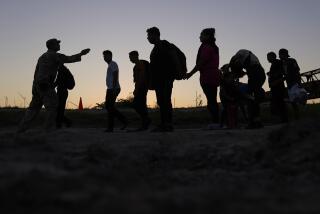INS Arrest Numbers Inflated, U.S. Says
Justice Department officials, after days of refusing to disclose the number of men and boys from Muslim countries arrested this week at INS offices, insisted Thursday that groups with a “bias against the system” had exaggerated the figures.
Groups representing Iranian and Arab immigrants in Southern California estimated Wednesday that between 500 and 700 men and boys, mostly Iranians, had been arrested in Southern California when they appeared at Immigration and Naturalization Service offices in response to a government order to register and be fingerprinted. INS officials, speaking anonymously Wednesday, said that they did not dispute those figures.
But Jorge Martinez, a Justice Department spokesman, said the total number of people detained in Southern California was “in the low 200s.” Most of those have been released, he said.
“As of midafternoon today, less than 100 people were in detention. Those numbers keep dwindling down,” he said. Many people were being released on bail and told to report back at a later date.
Lawyers who escorted clients to INS offices and groups representing Iranian and Arab immigrants, however, continued to say that the number of people who had been detained was higher than the INS figure. They agreed, however, that most have been released on bail.
Martinez also denounced reports that detainees had been treated badly -- shoved into overcrowded cells or hosed down with cold water -- calling the charges made by lawyers and relatives of detainees “preposterous allegations.”
“I think these are people who obviously have some bias against the system blowing things out of proportion,” he said.
The situation with arrests in Southern California was “unique,” he said, because of the region’s large Iranian population and because many people here had waited until the registration deadline to come forward. Many people had to be detained until the INS could complete background checks, Martinez said.
Under INS rules, men and boys older than 16 from certain countries who are in the United States on temporary visas are required to register. Citizens of the first five countries covered -- Iran, Iraq, Syria, Libya and Sudan -- were required to register by Monday of this week. People from an additional 13 countries are required to register in January.
The Justice Department’s response came as criticism of the INS’ handling of the registration program continued.
Rep. Jane Harman (D-Venice) wrote INS acting Commissioner Michael J. Garcia urging him to quickly hold a series of town hall meetings to explain the INS actions. The INS handling of the detentions could “set back our nation’s fight against terrorism,” she wrote.
“Many of the individuals who complied with the INS registration could be resources for our war; now they have been alienated.”
Martinez defended the detentions, which he called temporary.
“The vast majority was visa overstays or other immigration violations,” he said. “It is the INS’ duty to detain and process these individuals.
“That’s the appropriate action that they have to take. We want to make sure that we’re not letting people back into the community who pose a threat to the community.”
Across the country, many civil liberties groups and immigrants’ rights advocates have questioned both the Justice Department’s numbers and the rationale for the detentions. Because of the arrests, the registration program has hurt national security efforts, not helped them, the groups say.
In Southern California, the American Civil Liberties Union of Southern California, the Iranian American Lawyers Assn., the Council on American-Islamic Relations, the Muslim Public Affairs Council and the Japanese American Citizens League were among the groups that called on the government to end the registration program or extend registration deadlines.
Salam al-Marayati, executive director of the Muslim Public Affairs Council, said his organization faced a credibility problem with some of those it serves after announcing the registration requirements on its Web site.
“Members of our community are angry with us and feel that we should apologize,” Al-Marayati said. “We’ve been helping law enforcement open doors throughout the community and telling people that they should not fear the government; they’re here to protect us. So this is a major setback.”
Al-Marayati said he had been told by an immigration lawyer that as many as 1,000 people had been arrested in Southern California. He said he believed that terrorists might benefit from all the commotion.
“They have driven people into hiding now,” he said of the INS. “And if there are any more [Sept. 11 hijacker Mohamed] Attas and sleeper cells, well, now they can bury themselves amidst all this noise when before they might have been easier to detect.”
Others said terrorists would not have complied with voluntary registration anyway.
“The government has confused immigration policy with national security policy and is treating them as if they are the same thing,” said Hussein Ibish, communications director for the American-Arab Anti-Discrimination Committee.
The detentions seem likely to be challenged in court.
On Tuesday, Karen K. Meade, a Cleveland attorney representing four men from Syria and Iran, filed suit asking a federal judge to stop the INS from trying to deport them. The men were taken into custody by the INS Monday after registering, but later released on bail. The suit contends that the special registration program improperly discriminates against people based on ethnicity.
Shawn Sedeghat, an attorney in Sherman Oaks, said he plans to file a federal lawsuit soon contending that the INS has conducted the registration program in an unconstitutional manner.
More to Read
Sign up for Essential California
The most important California stories and recommendations in your inbox every morning.
You may occasionally receive promotional content from the Los Angeles Times.











